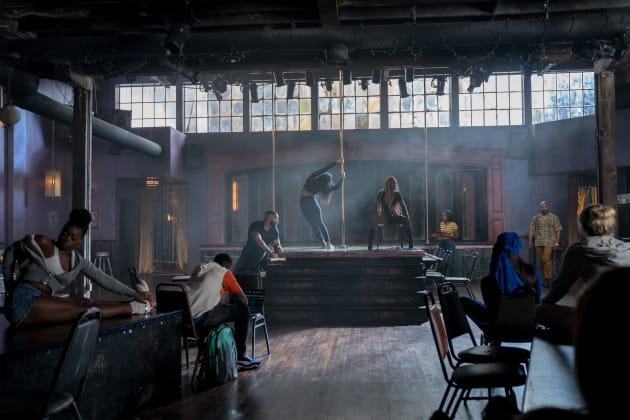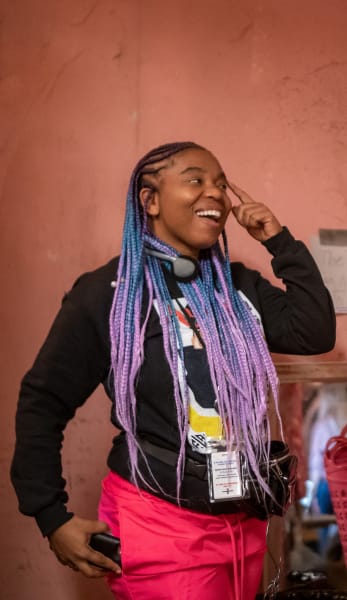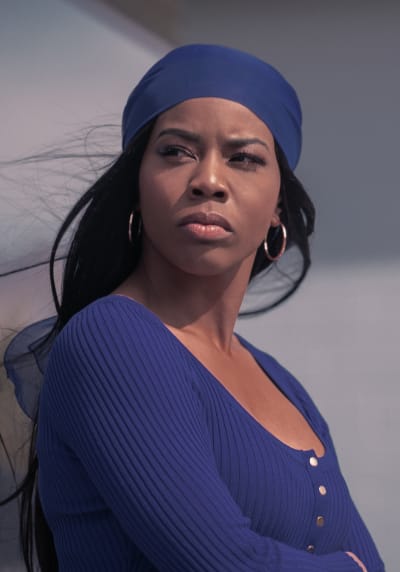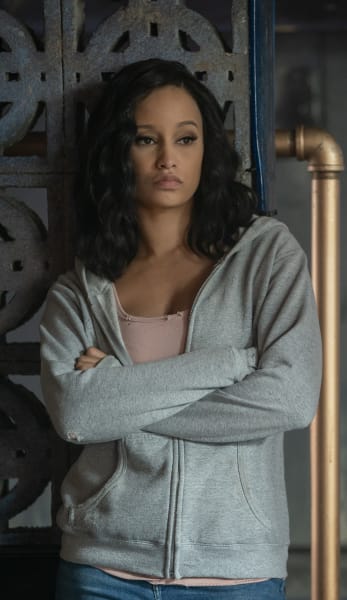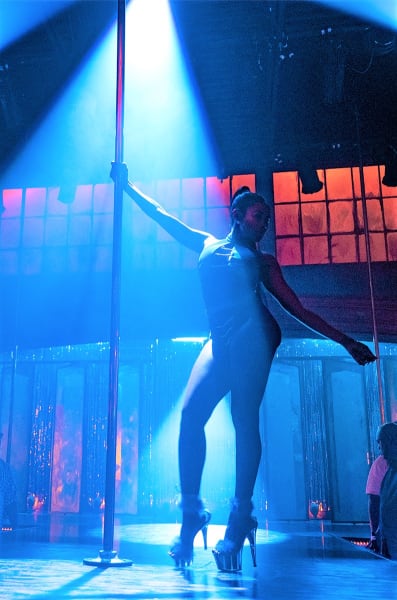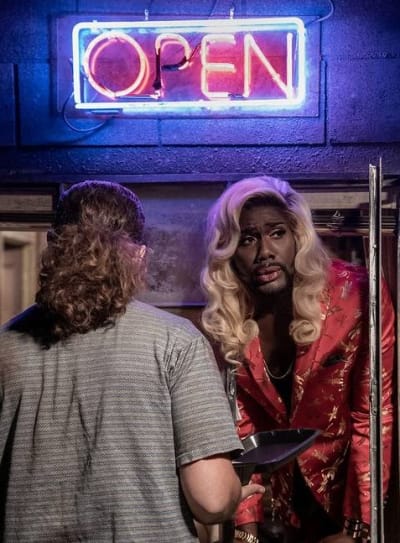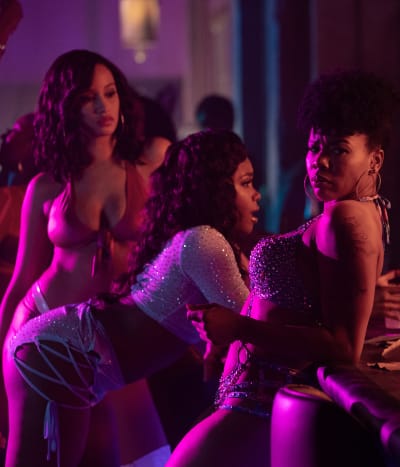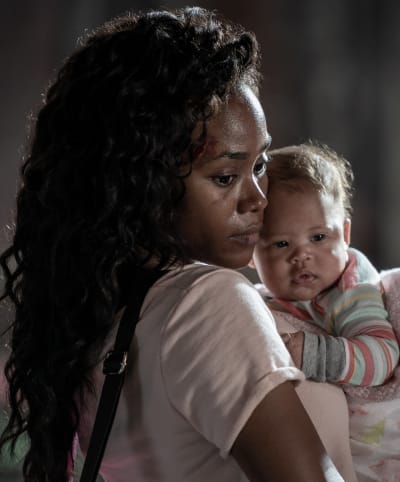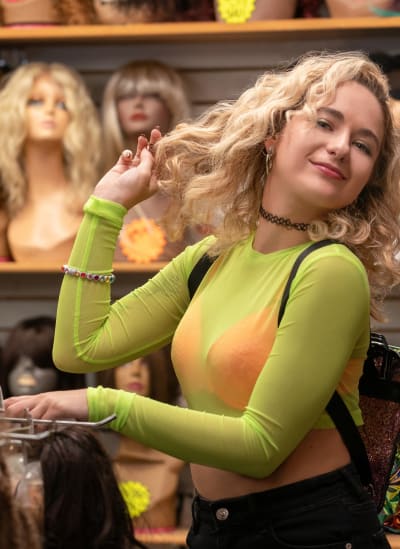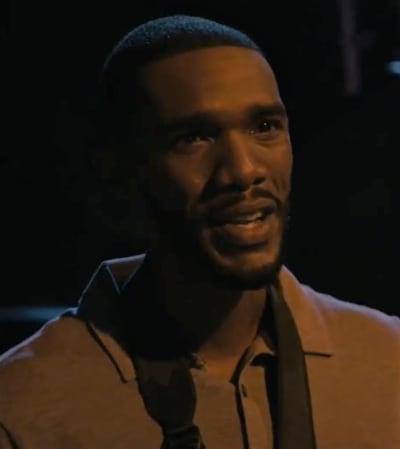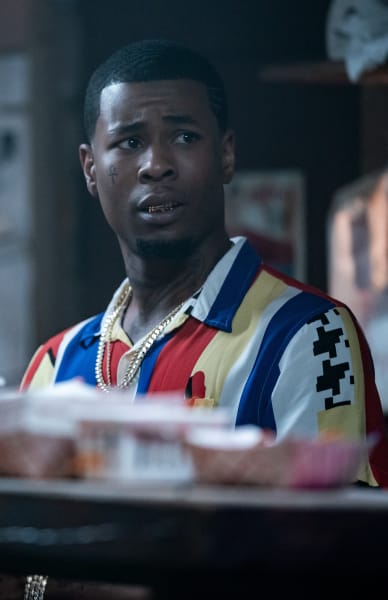Places where women gather are always great settings for TV series.
Like a tea party (if you’re British), or a nail or hair salon (if you’re American).
Or a strip club, if you’re award-winning playwright Katori Hall.
P-Valley, which debuts at 8 p.m. Sunday, July 12, on Starz, is the TV adaptation of Hall’s 2015 play Pussy Valley (the full name of which was one of the few things about this production too racy for Starz).
Think gritty, not pretty when it comes to this production set in a strip club in Mississippi’s “Dirty Delta.” But its all-female directors focus on the “female gaze,” telling women’s stories from a women’s perspective.
For men, there are beautiful women and a film-noir feeling to the series, which has an eight-episode first season.
Hall, who grew up in Memphis, remembers strip clubs as gathering places for birthday parties and showers.
And a place in which to be mesmerized: “You just go into that space and you are hit with one of the most amazing images one could see in their lives, which is a woman up on that stage and she’s flying around like a bird. It was like seeing a supershero when I would come into that space. I was always so impressed.”
About a decade ago, curiosity drove Hall to take a pole-dancing class, much to her body’s regret.
“That was the moment when I was like ‘What these women do is extremely hard. It is a craft. It is something that requires a lot of strength and a lot of bravery.’ And I really wanted to pay homage to that.”
What came next was six years of research, interviewing dancers, that yielded her play. But 2 ½ hours wasn’t nearly enough time to tell these characters’ stories.
“Thank God Starz gave me this opportunity to adapt it and change it into a television show,” Hall said.
What’s the biggest misconception people have about pole dancers?
“The biggest misconception people have about dancers is that they’re always thinking about sex, always having sex, all of them are prostitutes,” Hall said. “That’s just not true. Every woman is doing it for a completely different reason. The show aims to humanize these women who have been deemed objects by a lot of people in our society.”
P-Valley, filmed at Tyler Perry Studios in Atlanta, is set at The Pynk, a strip club run by gender-fluid hustler Uncle Clifford. Clifford is played by Nicco Annan, who also portrayed Clifford in the play.
Hall described The Pynk as a functionally dysfunctional family.
“Everybody has their role,” she explained. “Uncle Clifford is the mama. Autumn is the new adoptee. Mercedes is the older sister who doesn’t like it when people come and take her candy. Everyone is trying to have their own space and is jockeying for position inside of the club.”
Messing with The Pynk’s chemistry is the mysterious Autumn Night, who arrives out of nowhere running from who knows what and who keeps separate from her fellow dancers.
“Autumn is on a mission,” said Elarica Johnson, who plays Autumn. “She has no time for new friends or caring about people. She’s trying to put her life back together and keeping her distance helps her to not get distracted. Although she isn’t a heartless woman!”
Hall said that everyone should be wary of Autumn.
“It’s a secret she’s holding deep inside her designer handbag,” she said. “She works really hard to keep things to herself.”
The heart of The Pynk is Uncle Clifford, who looks out for the dancers like they are her own girls. She’s always dispensing platitudes of her own such as “Let the stage be your stepping stone, not your tombstone.”
“There are rules to the work, rules to the world,” Annan explained. “These are not just arbitrary things. These are real rules for the girls to live by, to be able to be safe, to be able to be fruitful, and to be able to get to the next level in this world, in the sex industry.”
Uncle Clifford has her own unique concept of business.
“Her approach to business is the same way she moves through life,” Annan said. “She knows how to finesse the situation. That’s something that women, and the power of femininity, offers you. A woman does not have to shout to be heard. There are different things Uncle Clifford uses to be heard, to be seen, and to make her point.”
The Pynk was previously a cotton mill, a speakeasy, and a juke joint, which got passed down through the generations. That’s why it holds special meaning to Uncle Clifford.
“This isn’t just a building,” Annan said. “It’s a house where people that she loves, both women and men, young and old, have respite here. They are able to have a home away from home and find employment where, in some places, they cannot get other legitimate jobs.”
When casting P-Valley, Hall looked for women who had acting chops first and foremost. Next came being comfortable with their bodies and the ability to be trained as pole dancers.
Hall got lucky with Brandee Evans, a former backup dancer for Katy Perry and Beyonce, who had transitioned into acting.
Evans cautioned that being changing dance styles was a challenge.
“As a backup dancer, it’s a set performance,” she said. “You don’t have to change the show. As Mercedes, if you’re doing these moves and all these crazy tricks and they’re not throwing the money, then you have to go even harder. You’re steadily trying to make yourself better in the middle of a performance.”
Mercedes is the queen bee of The Pynk, but she wants to retire and open a dance studio. It won’t be an easy transition.
“In any job when you’re leaving something you love, it’s not that simple,” Evans said. “It’s your livelihood. It’s what you know. It’s not an easy thing to do at all.”
Mercedes’s mother is Patrice, a local pastor who looks down on her daughter’s profession but who is more than happy to take her tithe.
Pointing to industries as diverse as professional sports and entertainment, Evans said, “It’s OK to profit off something but it isn’t OK not to accept that act.”
Also dancing at The Pynk is Keyshawn, AKA Miss Mississippi, played by Shannon Thornton. The club serves as an escape for her, as she’s involved in an abusive relationship.
Keyshawn’s goal is to become a star and take her kids and leave Mississippi and her abuser behind.
“She has these big dreams of being famous, and she will stop at nothing to get it,” Thornton said. “She’s a very smart, determined girl. It’s really inspiring.”
Finally, there’s Gidget, the white girl, who will be featured more later in the season. She’s a second-generation pole dancer and has a tempestuous relationship with her mother.
Gidget’s dream is to compete in the U.S. Pole Dancing Competition. But her big heart might get in her way.
“I feel like she is there for her girls,” said Skyler Joy, who plays Gidget. “I think there are times when she puts other people before her dreams, with her sisterhood and loyalty.”
Though P-Valley focuses on the women at the club, there are a couple of prominent male roles.
Andre Watkins, played by Parker Sawyers, is a native who is now an Atlanta businessman looking to build a resort nearby. The married Andre falls into a flirtation with Autumn, which doesn’t promise to be good for either of them.
“He’s focused on his business and building things and perhaps thinking 20 or 30 years in the future becoming a governor or a senator,” Sawyers said. “But The Pynk has its ways of getting you.”
The last thing Autumn needs is a relationship: “Anyone trying to keep people from figuring them out shouldn’t get close or involved with anyone,” Johnson said. “The question is if it did blow her cover, could she handle the consequence? She’s a tough woman with a lot to prove!”
Finally is wannabe rapper L’il Murda, played by J. Alphonse Nicholson.
“L’il Murda is a dreamer and I think nothing will get in his way of getting where he has to be as far as becoming a big-time rapper,” Nicholson said. “He’s still finding out a lot of different things about the world he’s in and the world he’s creating for himself and with his friends.”
The gay rapper and Uncle Clifford develop a simmering attraction.
“He respects Uncle Clifford as an entrepreneur,” Nicholson said. “He enjoys coming to The Pynk. He ends up finding a friend in Uncle Clifford and they are able to see certain things the same way.”
Hall went with all female directors in order to get the female-gaze vibe which she desired.
“It is about the woman’s perspective, about her experience,” she said. “The eight female directors that we picked had already dealt with it in their own work. They came to the table with some really fresh ideas as to how to use camerawork and cinematography to really drive home the point that this was a female-gaze show.”
With P-Valley’s nudity and language, it appears that Starz gave Hall a lot of latitude.
“You think so?” she said with a laugh. “I was always looking for more. They were supportive. It was absolutely a dream. They let me give the audience a Katori Hall experience.”
Dale McGarrigle is a staff writer for TV Fanatic. Follow him on Twitter.
